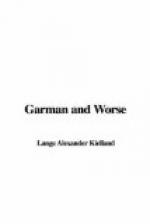At the same time, no one could say of Morten that he did not bring great energy to bear on his new duties. Now, indeed, it was almost impossible to find him; he was continually on the go between the town and Sandsgaard. His carriage might be seen waiting at the most unlikely corners, or all of a sudden he would pop up out of a boat at the quay, tear off to the office, call out something to the bookkeeper, and flash out of the door again. But when the bookkeeper hurried after him, to ask what the instructions were, all he saw was a glimpse of the dogcart as it turned the corner.
The business men in the town used to say, quietly among themselves, that it was easier to work against Morten than with him. Garman and Worse’s predominance began to grow weaker, and what had been the central power was now distributed in several hands. The year which followed was not a prosperous one for shippers; most of the ships belonging to the firm had been working either at a loss or at a very small profit. The most successful was the Phoenix, which had been put on the guano trade. She still continued to be a favourite, and her voyages were followed with great interest in the newspapers. The poet of the town had written some verses in her honour:—
“Rock proud, thou
fire’s daughter,
Thy flame-enshrouded
helm!”
It was doubtless this allusion to the helm, which had been most in danger at the time of the fire, which caused the success of the poem, and insured it a permanent position in all the concerts.
In accordance with the express wishes of the deceased, Jacob Worse had been chosen as guardian for Rachel and Gabriel. Mrs. Garman was still to remain in the position of partner, with Morten as manager of the business. For each of the younger children a considerable sum was set apart; a sum, in fact, which was just about equal to that with which Morten had entered the firm.
Rachel had thus to go to Jacob Worse for an explanation of her affairs, for she wanted to have a clear idea of what she really possessed, and what her exact position was. Worse answered her in a calm and measured business tone.
“Well, then, this money,” said she, one day, in Worse’s office, “is my own, and is entirely under my own control?”
“Yes, in addition to your share in the business,” added Worse, in explanation; “and if your mother should die, your part of her property will come to you at the division which will follow. It will then depend upon you or your future husband—”
“My future husband will surely allow me to manage my own property,” said Rachel.
“It is to be hoped he will; but, as you perhaps know, in the event of your marrying, you will lose the entire control.”
“Then I will never marry!”
“I am of opinion myself that you might do something better than marriage,” said Jacob Worse.
Rachel observed him closely, but failed to fathom his thoughts.




